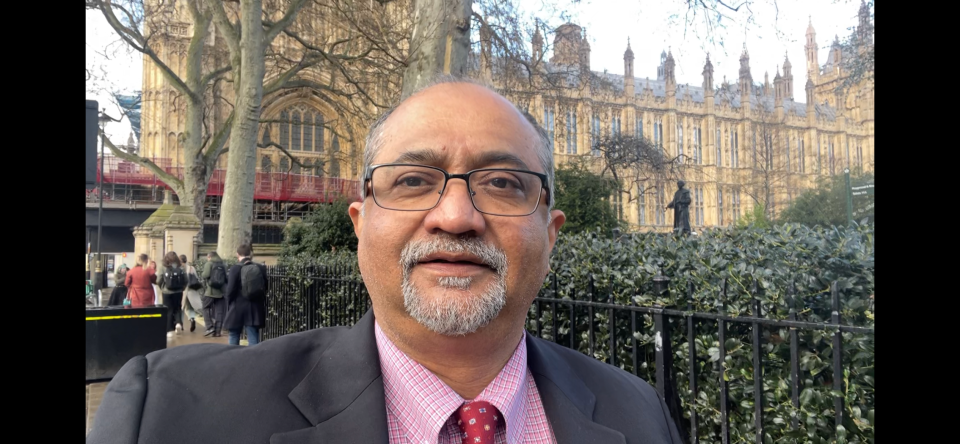Humans desire to do beautiful things; as a society we must follow that instinct | Opinion

Do beautiful things, God loves those who do beautiful things (Quran 2:195).
I trudged up the stairs, there were 44 of them, promising myself I would hit the gym as soon as Ramadan was over. When I reached the top and turned around to look down to the vast exhibition hall, my heart filled with joy as I saw an ocean of books, book sellers, book buyers, book publishers, writers, and readers. This was the London Book Fair, from April 5-7, of 2022 at the Olympia convention center. This is the biggest book fair in the world. This is where stories met storytellers. I was here for the launch of the MENA (Middle East and North Africa) edition of my book "Islam and Good Governance: A Political Philosophy of Ihsan.
My book is essentially about the role of values in good governance. It mines the Islamic mystical concept of Ihsan to envision a virtuous form of governance based on principles of compassion, virtue, aesthetics, and knowledge; all within the framework of a democratic state and a spiritual civil society. While Ihsan is the organizing principle of this model, it also draws on the constitution of Medina drafted by Prophet Muhammad, may peace and blessings be upon him.
Ihsan in its simplest form means to do beautiful things. In its mystical form it means to worship or serve God as if you see him, and if you cannot see him then to at least know that he sees you. The idea is that one has reached the mystical state wherein both God and the worshipper are witnessing each other. When one is in this state it is like a drop of water meeting the ocean. For some the ocean consumes the drop but for the mystic, the drop consumes the ocean. In this state there are no two entities, there is only the One. This is the goal of Ihsan, to become one with The One, through a process of self-annihilation known as Fanaa.
I argue in my book that in a world of heightened identity politics of race, gender, religion, and sexuality, where differences are more critical than commonalities, culture and societies tend to become more contentious and dysfunctional. One way to promote a more harmonious society is to build on commonalities or shared futures. But first, one must exercise some Fanaa, some self-negation. Specially, the most privileged in the society must give a little more and take a little less. It is this vector of the book that has appealed to the Muslim Council of Elders based in Abu Dhabi and led them to relaunch my book in the MENA region and translate it into Arabic. The Arabic translation will, inshallah, be available soon. This is the best Ramadan gift I ever received.
The Council of Muslim Elders, an international NGO, based in Abu Dhabi is composed of the most eminent scholars of Islam from several countries and is under the guidance of the grand Imam of Al-Azhar Ahmed Al-Tayyeb. Its goal is to promote coexistence and harmony everywhere. The council has launched an initiative called Publishing for Peace and Coexistence with the aim to publish and translate 10 books in various languages that promote tolerance and human fraternity. I am happy that my book has been selected as the first of these books. It is an honor for me and for the book.
The council also organized a panel at the fair on how to combat hate speech and promote co-existence. The panelists included Baroness Uddin a prominent social activist, a peer and member of the House of Lords, Canon Sarah Snyder who is Archbishop of Canterbury’s advisor for reconciliation, and yours truly. The Baroness spoke on the role of social activism in combating hate, Canon Snyder spoke about the role of faith in promoting reconciliation and I spoke about the role of education and the struggle for diversity and inclusion on American university campuses.
Later, thanks to the Baroness, I was able to visit the British parliament and attend a debate in the main hall. It was an interesting experience. The main hall is a bit ostentatious but also a work of art. The attention to detail and investment in craftsmanship of the hall and the royal gallery tells us what this institution means to the British people. I took half a day off and visited Stonehenge. To me, its mystique is both awe-inspiring and spiritual. While in London I was able to attend an Iftar – breaking of fast in Ramadan – ceremony and prayers at the famous Regents Park Mosque in central London. Its very diverse congregation is a microcosm of London and a good example of racial, ethnic, and sectarian coexistence.
All three sacred places reminded me that Ihsan, the desire to do something beautiful, is a human instinct. People have always done beautiful things and will continue to do so.
Muqtedar Khan is a professor at the University of Delaware and hosts a YouTube show called Khanversations.
This article originally appeared on Delaware News Journal: Humans must follow the instinct to do beautiful things

 money
money 